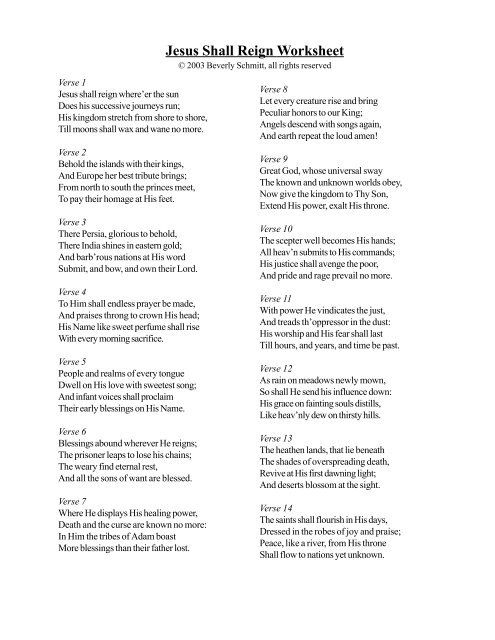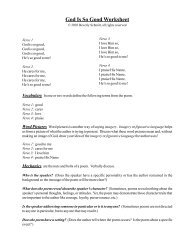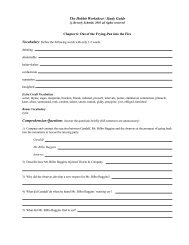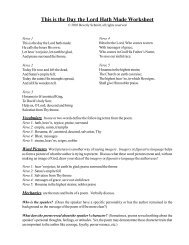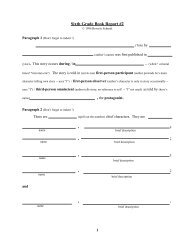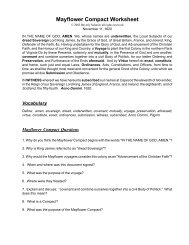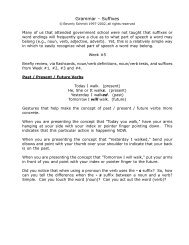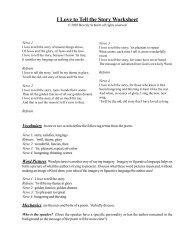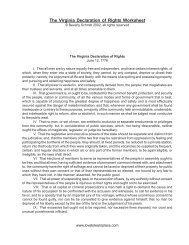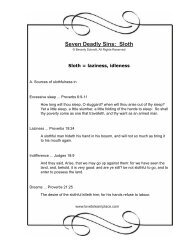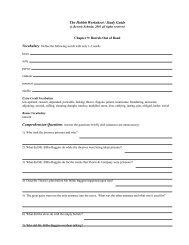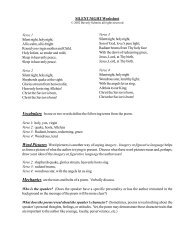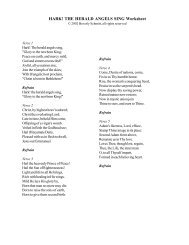Jesus Shall Reign Worksheet - Love to Learn Place
Jesus Shall Reign Worksheet - Love to Learn Place
Jesus Shall Reign Worksheet - Love to Learn Place
Create successful ePaper yourself
Turn your PDF publications into a flip-book with our unique Google optimized e-Paper software.
Verse 1<br />
<strong>Jesus</strong> shall reign where’er the sun<br />
Does his successive journeys run;<br />
His kingdom stretch from shore <strong>to</strong> shore,<br />
Till moons shall wax and wane no more.<br />
Verse 2<br />
Behold the islands with their kings,<br />
And Europe her best tribute brings;<br />
From north <strong>to</strong> south the princes meet,<br />
To pay their homage at His feet.<br />
Verse 3<br />
There Persia, glorious <strong>to</strong> behold,<br />
There India shines in eastern gold;<br />
And barb’rous nations at His word<br />
Submit, and bow, and own their Lord.<br />
Verse 4<br />
To Him shall endless prayer be made,<br />
And praises throng <strong>to</strong> crown His head;<br />
His Name like sweet perfume shall rise<br />
With every morning sacrifice.<br />
Verse 5<br />
People and realms of every <strong>to</strong>ngue<br />
Dwell on His love with sweetest song;<br />
And infant voices shall proclaim<br />
Their early blessings on His Name.<br />
Verse 6<br />
Blessings abound wherever He reigns;<br />
The prisoner leaps <strong>to</strong> lose his chains;<br />
The weary find eternal rest,<br />
And all the sons of want are blessed.<br />
Verse 7<br />
Where He displays His healing power,<br />
Death and the curse are known no more:<br />
In Him the tribes of Adam boast<br />
More blessings than their father lost.<br />
<strong>Jesus</strong> <strong>Shall</strong> <strong>Reign</strong> <strong>Worksheet</strong><br />
© 2003 Beverly Schmitt, all rights reserved<br />
Verse 8<br />
Let every creature rise and bring<br />
Peculiar honors <strong>to</strong> our King;<br />
Angels descend with songs again,<br />
And earth repeat the loud amen!<br />
Verse 9<br />
Great God, whose universal sway<br />
The known and unknown worlds obey,<br />
Now give the kingdom <strong>to</strong> Thy Son,<br />
Extend His power, exalt His throne.<br />
Verse 10<br />
The scepter well becomes His hands;<br />
All heav’n submits <strong>to</strong> His commands;<br />
His justice shall avenge the poor,<br />
And pride and rage prevail no more.<br />
Verse 11<br />
With power He vindicates the just,<br />
And treads th’oppressor in the dust:<br />
His worship and His fear shall last<br />
Till hours, and years, and time be past.<br />
Verse 12<br />
As rain on meadows newly mown,<br />
So shall He send his influence down:<br />
His grace on fainting souls distills,<br />
Like heav’nly dew on thirsty hills.<br />
Verse 13<br />
The heathen lands, that lie beneath<br />
The shades of overspreading death,<br />
Revive at His first dawning light;<br />
And deserts blossom at the sight.<br />
Verse 14<br />
The saints shall flourish in His days,<br />
Dressed in the robes of joy and praise;<br />
Peace, like a river, from His throne<br />
<strong>Shall</strong> flow <strong>to</strong> nations yet unknown.
Vocabulary In one or two words define the following terms from the poem.<br />
Verse 1: reign, where’er, successive, kingdom, wax, wane<br />
Verse 2: Europe, tribute, homage<br />
Verse 3: behold, barb’rous, submit<br />
Verse 4: throng, sacrifice<br />
Verse 5: realm, <strong>to</strong>ngue, dwell, proclaim<br />
Verse 6: abound, weary<br />
Verse 7: displays, tribes, boast<br />
Verse 8: Peculiar, descend, amen<br />
Verse 9: universal, sway, extend, exalt<br />
Verse 10: scepter, heav’n, justice, avenge, pride, prevail<br />
Verse 11: vindicates, treads, th’, oppressor, worship<br />
Verse 12: mown, influence, distills, heav’nly<br />
Verse 13: heathen, overspreading, Revive<br />
Verse 14: saints, flourish<br />
Word Pictures Word pictures is another way of saying imagery. Imagery or figurative language helps<br />
us form a picture of what the author is trying <strong>to</strong> present. Discuss what these word pictures mean and, without<br />
making an image of God, draw your idea of the imagery or figurative language the author uses!<br />
Verse 1: His kingdom stretch from shore <strong>to</strong> shore; moons shall wax and wane<br />
Verse 2: islands with their kings; Europe her best tribute brings;<br />
Verse 3: Persia glorious <strong>to</strong> behold; India shines in eastern gold; Submit and bow<br />
Verse 4: endless prayer; praises throng<br />
Verse 5: People and realms of every <strong>to</strong>ngue; infant voices shall proclaim<br />
Verse 6: prisoner leaps <strong>to</strong> lose his chains<br />
Verse 7: healing power; Death and the curse are known no more; tribes of Adam<br />
Verse 8: Let every creature rise; Angels descend with songs; earth repeat the loud amen!<br />
Verse 9: Extend His power, exalt His throne<br />
Verse 10: scepter; All heav’n submits <strong>to</strong> His commands; justice shall avenge the poor<br />
Verse 11: vindicates the just; treads th’oppressor in the dust<br />
Verse 12: meadows newly mown; fainting souls; heav’nly dew on thirsty hills<br />
Verse 13: heathen lands; shades of overspreading death, deserts blossom<br />
Verse 14: saints shall flourish; Dressed in the robes of joy and praise;<br />
Mechanics are the nuts and bolts of a poem. Verbally discuss.<br />
Who is the speaker? (Does the speaker have a specific personality or has the author remained in the<br />
background so the message of the poem will be more clear?)<br />
What does the poem reveal about the speaker’s character? (Sometimes, poems reveal nothing about the<br />
speaker’s personal thoughts, feelings, or attitudes. Yet, the poem may demonstrate those character traits that<br />
are important <strong>to</strong> the author like courage, loyalty, perserverance, etc.)<br />
Is the speaker addressing someone in particular or is it <strong>to</strong> anyone? (Sometimes poems are not directed<br />
<strong>to</strong> anyone in particular, but <strong>to</strong> anyone that may read it.)<br />
© 2003 Beverly Schmitt, all rights reserved
Does the poem have a setting? (Does the author tell where the poem occurs? Is the poem about a specific<br />
event? )<br />
Is the poem about a particular event? (Is the event past or present? If it is about a past event, does the<br />
remembrance of the event have a particular meaning <strong>to</strong> the speaker?)<br />
Is the theme of the poem stated directly or indirectly? (Some poems are straightforward and are meant<br />
<strong>to</strong> be taken literally. In songs, the theme may be presented in the refrain or in the last few lines. Sometimes the<br />
theme is a little bit more difficult <strong>to</strong> discern as it is made with figurative language or symbols.)<br />
What point of view or perspective is the speaker? (What meaning do you think the poem has for the<br />
author?)<br />
How did you respond <strong>to</strong> the poem when you read it the first time? (Did your thoughts and feelings<br />
change after you <strong>to</strong>ok time <strong>to</strong> study it?)<br />
Comprehension Questions Verbally discuss<br />
Verse 1: According <strong>to</strong> the author, Who reigns? How far does His kingdom stretch? For how long will His<br />
kingdom reign?<br />
Verse 2: What do the island kings, Europe and princes from the north and south do?<br />
Verse 3: What two nations in this verse submit and bow <strong>to</strong> this King? How do “barb’rous nations” respond<br />
<strong>to</strong> His word?<br />
Verse 4: Who shall receive “endless prayer”? Who shall receive “praises”? What is like “sweet perfume”?<br />
Verse 5: The term “<strong>to</strong>nue” means foreign languages. What shall peoples and realms of every <strong>to</strong>ngue do?<br />
What shall infant voices proclaim?<br />
Verse 6: What abounds where this Ruler reigns? What does the prisoner do? How do the weary respond?<br />
What happens <strong>to</strong> the poor or the “sons of want”?<br />
Verse 7: What are known “no more”? What should the tribes of Adam boast?<br />
Verse 8: What should every creature do? How are honors described? What do the angels do? How does the<br />
earth respond?<br />
Verse 9: Who do the “known and unknown worlds obey”? Who now has the kingdom? Explain and discuss:<br />
“Extend His power, exalt His throne.” How can a homeschooled and/or private schooled youth “extend His<br />
power, exalt His throne” with respect <strong>to</strong> literature? his<strong>to</strong>ry? math? science? civics? foreign languages? grammar?<br />
sports? etc.<br />
Verse 10: What “becomes” His hands? What does “heav’n” submit <strong>to</strong>? Explain and discuss: “His justice shall<br />
avenge the poor, And pride and rage prevail no more.”<br />
Verse 11: Who does He vindicate? Who is tread in the dust? Explain and discuss: “His worship and His fear<br />
shall last, Till hours, and years, and time be past.”<br />
Verse 12: How shall His influence be sent? Where does grace fall? How is the falling described?<br />
Verse 13: How are heathen or humanistic lands described? How do the heathens or the humanists respond <strong>to</strong><br />
His light? How do deserts react?<br />
Verse 14: How shall the saints respond? How shall they dress? Explain and discuss: “Peace, like a river, from<br />
His throne, <strong>Shall</strong> flow <strong>to</strong> nations yet unknown.”<br />
© 2003 Beverly Schmitt, all rights reserved
Did this his<strong>to</strong>rical and current event along with the poem’s message become more real <strong>to</strong> you after reading this?<br />
Why?<br />
After reading this poem, what character traits did you think of? What does the Bible have <strong>to</strong> say about these<br />
character traits?<br />
What Does the Bible Say?<br />
Find Scripture proofs for each of the assertions or statements made for each of the fourteen verses.<br />
Discuss this poem in light of the ...<br />
Cultural Mandate (what God said <strong>to</strong> Adam and Eve) ... And God blessed them, saying, Be fruitful, and<br />
multiply, and fill the waters in the seas, and let fowl multiply in the earth. (Genesis 1:28)<br />
Dominion Mandate (what God said <strong>to</strong> Noah after the Flood) ... And God blessed Noah and his sons, and<br />
said un<strong>to</strong> them, Be fruitful, and multiply, and replenish the earth. (Genesis 9:1)<br />
Great Commission (<strong>Jesus</strong>' command that reaffirmed the Cultural and Dominion Mandates) ... And <strong>Jesus</strong><br />
came and spake un<strong>to</strong> them, saying, All power is given un<strong>to</strong> Me in heaven and in earth. Go ye therefore, and<br />
teach all nations, baptizing them in the name of the Father, and of the Son, and of the Holy Ghost: Teaching<br />
them <strong>to</strong> observe all things whatsoever I have commanded you: and, lo, I am with you alway, even un<strong>to</strong> the end<br />
of the world. Amen. (Matthew 18:18-20)<br />
The Author/Poet<br />
Based on what you have studied about this poem so far, would you guess that the author was a Christian or<br />
a humanist? How did you arrive at your decision?<br />
The name of the author for this poem or lyric is Isaac Watts (1674-1748). He was born 17 July 1674, in<br />
Southamp<strong>to</strong>n, England, and died 25 November 1748, in S<strong>to</strong>ke Newing<strong>to</strong>n, England. He is buried at Bunhill<br />
Fields Cemetery, London, England. Watt’s had an interesting father who was imprisoned two times for his<br />
religious views. Mr. Watts studied Greek and Latin but declined an offer for a standard university education<br />
preferring <strong>to</strong> attend the Nonconformist Academy at S<strong>to</strong>ke Newing<strong>to</strong>n in 1690. When Mr. Watts was 20-22<br />
he stayed at home and wrote the majority of the hymns for Hymns and Spiritual Songs that were published in<br />
1707-1709. For six years he was the tu<strong>to</strong>r Mr. John Har<strong>to</strong>pp’s son. Mr. Watts was ordained in 1702.<br />
"Give 'em Watts, boys, give 'em Watts!"<br />
Interestingly, Isaac Watts is intimately connected with the American War of Independence. In an attack upon<br />
Springfield when the patriots' wadding gave out, Rev. James Caldwell (of Huguenot descent) ran in<strong>to</strong> a<br />
Presbyterian church returning with his arms and pockets crammed full with Watts' Psalms and Hymns saying,<br />
"Now, boys, give them Watts!" The British offered large rewards for the capture of Rev. Caldwell, but <strong>to</strong> no<br />
avail. Therefore, the British burned his church, shot his wife while she was in the midst of their nine children,<br />
dragged her body in<strong>to</strong> the street, and burned his home and out buildings.<br />
© 2003 Beverly Schmitt, all rights reserved
Geography<br />
Locate Europe, Southamp<strong>to</strong>n, England, London and India on a globe, map and atlas.<br />
Challenge Locate S<strong>to</strong>ke Newing<strong>to</strong>n (England) and Persia (Iraq) on a map or in an atlas.<br />
Compare/contrast England’s weather with your own for one week.<br />
Make an English meal for your family.<br />
Activities<br />
1) Make your own book! Without making an image of Christ, draw pictures repesenting each verse. (Note:<br />
that will be fourteen different illustrations). With construction paper and other items readily available at home,<br />
make a title page with the name of the song and the author’s name which will be your book’s cover. You may<br />
want <strong>to</strong> illustrate your cover and include this poem in your book.<br />
2) Make your own play! Re-enact with your siblings or friends the his<strong>to</strong>rical and current events along with the<br />
message discussed in this poem. Keep it lively, simple, and short. You may want <strong>to</strong> end your play with singing<br />
a rousing chorus of this poem or reading Scripture verses. Videotape your creation.<br />
3) Radio Drama! With a handheld tape recorder, create your own radio show dramatizing the his<strong>to</strong>rical and<br />
current events along with the message discussed in this poem.<br />
4) Be a Reporter! Either with your family camcorder or with a handheld tape recorder, “interview” various<br />
individuals connected with this poem (e.g., humanists or heathens, heads of nations either current or past,<br />
Christendom’s civil servants past and present, angels, apostles, Alfred the Great, Christian soldiers, etc.). In<br />
order <strong>to</strong> have the fast paced style of a reporter, watch and/or listen <strong>to</strong> the news with your parents’ permission.<br />
Keep the interviews lively, quick, and <strong>to</strong> the point.<br />
Remain objective! Being objective means just reporting the facts and not giving your opinion of the situation.<br />
5) What is one of the things you most enjoy? Is it literature? math? science? sports? cooking? Take that area<br />
of interest and relate that <strong>to</strong> this poem. If you enjoy dance, for example, develop a dance routine that physically<br />
expresses the sentiments of this poem. If you enjoy shop, create something out of wood that helps <strong>to</strong> clarify<br />
this poem. Do you enjoy creating s<strong>to</strong>ries? Write a s<strong>to</strong>ry based on any time period you desire that expresses<br />
the sentiments of this poem. Do you enjoy creating things in the kitchen? Make an ancient meal from this time<br />
or develop your own meal that symbolizes the many different points this poem makes.<br />
6) Poster. Create a poster illustrating the the author’s view of the impact of <strong>Jesus</strong> <strong>Shall</strong> <strong>Reign</strong>.<br />
7) Scavenger Hunt. Go <strong>to</strong> the library <strong>to</strong> learn what you can about Isaac Watts (1674-1748) and share it with<br />
your family. If possible, discover the s<strong>to</strong>ry behind this poem.<br />
© 2003 Beverly Schmitt, all rights reserved


